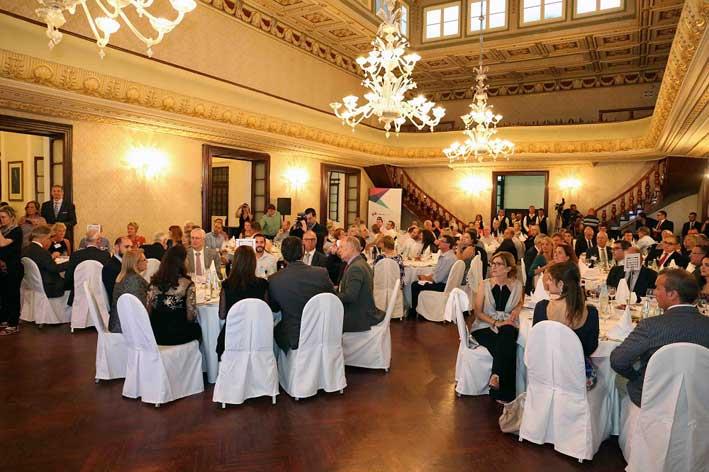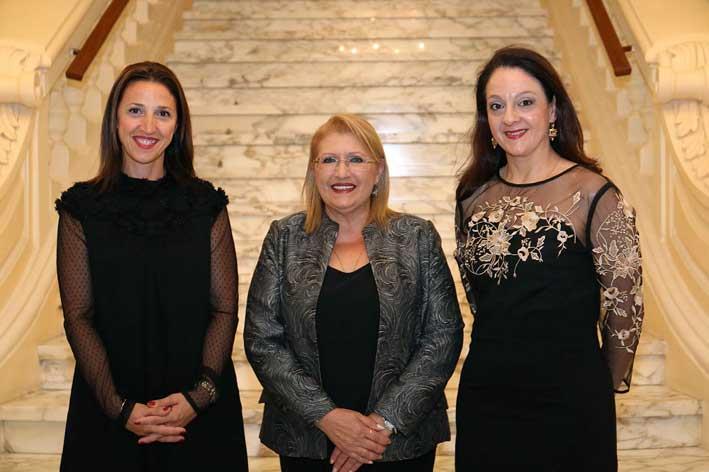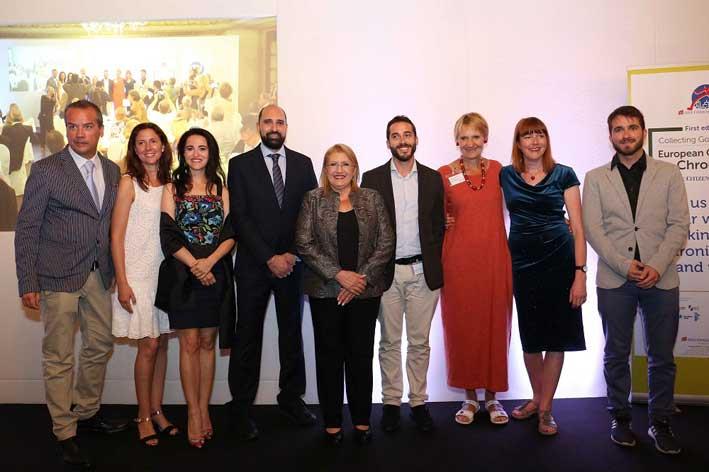"We cannot allow anybody to feel alone, isolated, or ignored with their pain" - opening speech by the President of Malta at the European Union Civic Prize on Chronic Pain, organised by the Active Citizenship Network
It is my pleasure to open this award ceremony, celebrating the European Union Civic Prize. I would like to commend all the participants, for their contributions to this research project, to collect good practices, upon which the European Civic Prize on Chronic Pain has been established.
On the other hand, I would like to take the opportunity to congratulate the recipients of this award. Let me also take this opportunity to thank all of you, for your many years of work, forming new connections among different organisations; sharing best practices; and for organising this symposium, to continue to raise awareness about chronic pain and its effects.
Thanks to the work of the six main organisations, facilitating this event, and your collaborators, we are sending a powerful statement, through this symposium, about our united commitment, to safeguard the wellbeing of all people living with chronic pain.
In my various meetings with members from the "ME, CFS and Fibromyalgia Alliance", an NGO which is actively advocating for chronic pain sufferers in Malta, I have had the opportunity to hear first-hand experiences, of people living with such conditions.

Through my connection with members from this Maltese alliance, I have learnt that, when our systems are unable to provide effective outreach and sustained support, many sufferers feel that their quality of life is diminished.
While their families, communities, and the whole of society are also very negatively affected.
I believe that the issue of chronic pain must take more importance within our healthcare systems and policies, both nationally and at the widest possible European levels, for us to continue to push for proactive and effective change.

Creating, and sustaining further connections, between civil society activists, from around the world, will highlight, even more, the vast numbers of people who are being affected.
I am convinced that it will also create a spirit of solidarity among sufferers, their families, and other members of society.
Indicators from the International Association for the Study of Pain, and the European Pain Federation, state, that one in five people suffer from moderate to severe chronic pain.
Furthermore, one in three are unable, or less able, to maintain an independent lifestyle due to their pain. The effect of their pain also means that one in four people report that their relationships, with family and friends, are severely strained.
According to Professor Harald Breivik, former president of the European Pain Federation, and I quote;
"Chronic pain is one of the most underestimated healthcare problems in the world today, causing major consequences for the quality of life of the sufferer, and a major burden on the healthcare system in the Western world." End quote.
Speaking about fibromyalgia specifically, data from the World Health Organisation says that its prevalence is between 3 and 6 percent of the global population.
These indicators should convince all across the world to work together, in greater synergy, across civil society and diverse medical sectors, to encourage greater awareness.
However, civil society must also continue with their efforts to push authorities to take action, on behalf of all people who live with chronic pain.
For example, I believe that a European level policy should be drafted, to specifically target these concerns.
People living with chronic pain are not only dealing with the pain itself, but also with uncertainty, discomfort, and confusion.
Often, sufferers report feeling overwhelmed when they are dealing with their situation.
These factors can all contribute to a disabling effect on the individual, who is, regardless, expected to continue to function in their places of work, their communities, and their societies.
I believe that there is still a worrying lack of respect and understanding, for people living with chronic pain.
This is a cause for great concern.
Therefore, I believe that we must, first of all, encourage more knowledge about the underlying challenges faced by people living with chronic pain. This means looking at the problem of ableism, within our societies.
As many of us know, ableism refers to practices and prevailing attitudes, which are present in our communities and institutions.
These practices and attitudes often devalue and limit the potential of persons with disabilities, or people living with disabling conditions, which could also be an invisible disability.
We must raise awareness about the fact that our systems, institutions, and policies are not always responding, in an adequate and effective manner, to the legitimate needs of people who are living with disabling conditions.
Such a situation means that many of our public and private places, services, education, and social outreach, are not fully inclusive.
Indeed, they can become a source of exclusion, making it difficult for us to achieve the full and equitable participation of all citizens, including those with disabling conditions.
This reality is often invisible to those who do not have disabilities, or disabling conditions, or to those who are not yet sensitive to these issues.
Pain is a worldwide problem. Indicators from the World Health Organisation assert that 20 percent of adults suffer from pain, around the globe, and 10 percent are newly diagnosed with chronic pain each year.
Moreover, studies tell us that women are overrepresented among these indicators.
Such challenges are of particular importance when we talk about the experiences of women and minority groups, who are primarily affected.
There is a lack of research on chronic pain worldwide, and this is particularly evident in the Maltese context. The first study conducted in Malta, to focus on the voices of women with fibromyalgia, was carried out in 2015 by Angie Chircop Coleiro.

The study, entitled "Working with Fibromyalgia: The lived experience of women with fibromyalgia in the workplace", states that, although many affected women said they were reluctant to be perceived as disabled; fibromyalgia has a clearly disabling effect on their lives.
Let me quote from this study, where women said that it was, "a burden not just to them, but also on their families. Thus, they believe that gaining disability status can provide them with some form of official recognition, as well as financial aid." End quote.
Furthermore, an international study entitled "Defining Racial and Ethnic Disparities in Pain Management", which appeared in the Journal of Clinical Orthopedics and Related Research, states that, and I quote, "Racial and ethnic minorities consistently receive less adequate treatment for acute and chronic pain". End quote.
Racial or ethnic minority individuals, living with issues of chronic pain, need to be empowered to seek and receive appropriate support and care.
It is essential that the medical professionals who are treating such individuals are aware of their own attitudes and potential prejudices, which may be making the problem, for the sufferer, more difficult.
There must be more emphasis to develop strategies, and again, I quote from the study on "Defining Racial and Ethnic Disparities in Pain Management", that we must do more, "to overcome unconscious, but potentially harmful, negative stereotyping of minority patients." End quote.
These facts point to the complex realities experienced by chronic pain sufferers, and the need to deal with them in an intersectional way.
We must ensure that gender, and racial or ethnic backgrounds, inform the way authorities formulate and implement their policies.
I believe that stronger synergies between civil society and medical professionals would be a powerful catalyst to highlight these intersectional concerns.
I also believe that such synergies can also encourage authorities to acknowledge the disabling effect of chronic pain, and to respond accordingly, across institutions and public services.
We must promote issues of chronic pain as a matter of urgent importance, including to the medical community.
I believe that, due to the effects of ableism, we must do more to create a necessary social and cultural change, through education and awareness, in our attitudes, towards people living with chronic pain.
We must also emphasize the disproportionate number of women who are living with conditions of chronic pain, and the particular challenges faced by minority groups in accessing necessary support and care.
Finally, we must assert that chronic pain is an issue of relevance to public health. We must assert that authorities, including the European Union, should incorporate chronic pain into their strategies for effective outreach, across our societies.
In conclusion, let me once again congratulate today's all participants in this research project, and today's award winners, for their substantial contributions to the strengthening of this sector.
I hope that you shall continue to collaborate, and produce timely, and relevant, good practices and policy recommendations, which reflect the real experiences of people living with chronic pain.
Let us keep emphasizing that we need to act, now.
In the words of popular author John Green, who is himself a chronic pain sufferer, and I quote, "Language is always inadequate in the face of pain." End quote.
However, we must keep trying, as best as we can, to create empowering spaces for people, struggling with chronic pain, to give a voice to their narratives.
It is sometimes impossible to accurately convey the intensity and the impact that chronic pain can have, on the lives of sufferers and their families.
Sometimes, words fail us, and it is in those moments that we must show the most solidarity and support.
We cannot allow anybody to feel alone, isolated, or ignored with their pain.
We must work together to continue improving our institutions, communities, and societies, ensuring that they respect the experiences of all; that they are truly inclusive and fully participatory; and that they celebrate the dignity, and the potential, of each and every person, by putting in place the necessary good practices and policies in our healthcare systems.